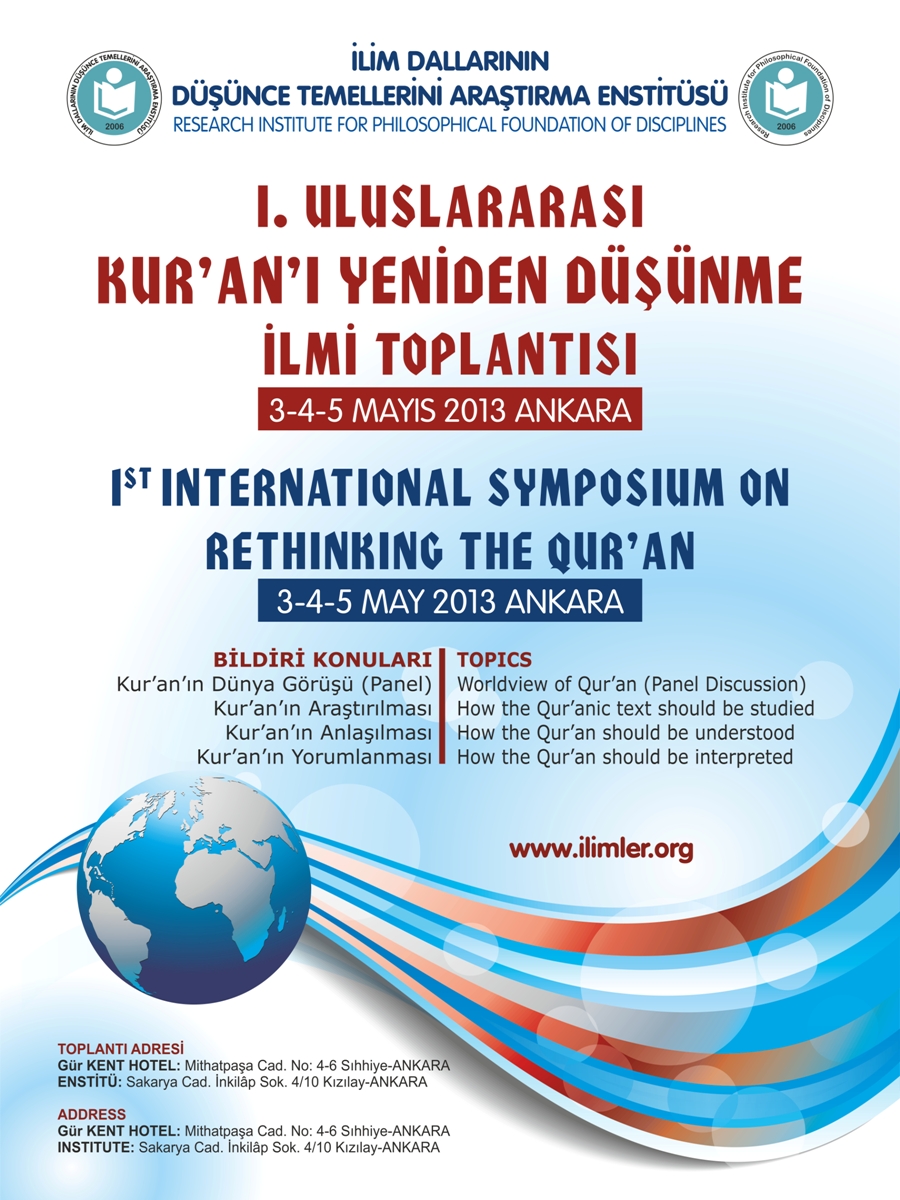First International Symposium on Rethinking the Qur’an
By Andrew Rippin
ANKARA—On May 3-5, 2013, the Research Institute for Philosophical Foundations of Disciplines (İlim Dallarının Düşünce Temellerini Araştırma Enstitüsü) in Ankara sponsored the First International Symposium on Rethinking the Qur’an. With papers presented by fifty-one participants from about twenty countries worldwide, and with attendance topping 200 people—more than 50% of whom were women—this was an event of some significance.
The concern of the local community with the idea of “rethinking” the Qur’an was evident, both in the papers delivered and in the composition of the audience. Many expressed opinions about the best method by which the Qur’an might be understood and about why that process of understanding was so difficult. As numerous speakers said, while no doubt is harbored that the Qur’an is a revelation from God, the problem of the need for a method to understand the text remains. The discussion was open and often surprising (to an “outsider” such as myself), and the tone remained—for the most part—earnest yet respectful. Such conversations were facilitated and kept available to all through simultaneous translation of English and Turkish (as well as Arabic and Persian in some panels).
The question of whether academic scholarship has anything to contribute to the task of “rethinking the Qur’an” was brought to the surface through the participation of several scholars who adopted a theoretical angle. (Literary, historical, and comparative religion approaches were especially evident.) This sort of conversation between perspectives on the study of the Qur’an has, at the very least, the merit of breaking down the perceived barriers between academic work and devotional concerns.
There were some papers that particularly drew the attention of the audience and others that reflected theoretical sophistication of considerable interest. Several papers from Iranian participants, given in English, were focused on linguistic structures and informed by general theory, for example. One presentation from a Mauritanian/Moroccan scholar on qiwama in the context of Q. 4.34—as can likely be imagined by readers of this blog—aroused impassioned responses and evoked many reinterpretations of the passage on the part of the audience, despite the speaker’s attempt to emphasize the need to follow the methods of al-Jabiri, Arkoun and Fazlur Rahman.
There is no doubt that a theological agenda was close to the surface in many of the papers and discussions, and this was totally explicit in the two concluding talks of the symposium. One challenge that clearly emerged as critical was that of resolving the hermeneutical problems of multiple meanings in the text, without the believer’s reverence for the text overcoming the scholar’s constructive analysis (such that the result is simply a statement of belief). And, as was argued, another common problem among religious believers is that of engaging the text without allowing the fear of the outcome of one’s study to overpower the enunciation of one’s ideas (thus simply leading to acceptance of what has “always” been thought.) Such thoughts are especially interesting to those of us who reflect upon trends in modern Islamic thinking; but they also illustrate the gap that remains between scholarship within the Euro-American tradition of Qur’anic studies and expected motivations when speaking to an audience in a country such as Turkey.
The difference here is, of course, familiar: it is the same tension that is experienced in religious studies in general, whether thought of as the insider-outsider dilemma or as the problem of defining religious studies as compared to theology. But what this gathering illustrated to me, at least, is the necessity for the interaction between the different perspectives—both for communication and for chipping away at the preconceptions held on both sides of the discussion. For that, this symposium was a tremendous success.
It is anticipated that a second symposium, focusing on rethinking concepts in the Qur’an, will be held next year.
© International Qur’anic Studies Association, 2013. All rights reserved.







